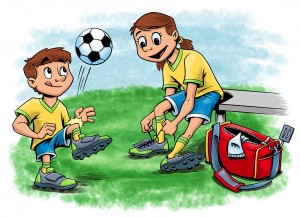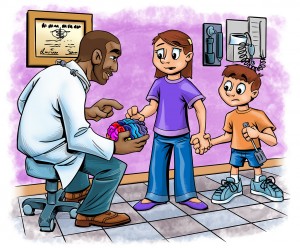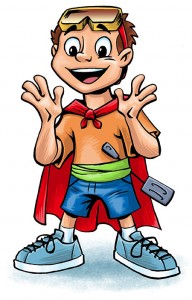 The FTD Team
The FTD Team
Have you ever been part of a team? We have. I play soccer and Connor plays football at recess with his friends. The best part about being part of a team is that together you can do so many things that you couldn’t do by yourself. We really learned how important a team is when Dad got sick. There are lots of people on our FTD Team. They all play an important part. You are an important part of the team now, too!
Teamwork is important when someone you love has FTD. It takes a team to manage all the things that are changing. Just like families can be different, everyone’s FTD Team will be a little different. Here are some of the people who might be on your FTD Team:
Team captain
Every good team has a Team Captain — the leader of the group. This might be your healthy parent or another family member. This job is very important. It is a tough job that takes a lot of time. The Team Captain takes care of the person with FTD and leads the other players (like you). He or she makes sure everyone else on the team is doing their job.
Who is the Captain of your FTD Team?
Coaches (Doctors)
The Coaches on an FTD Team are the doctors. They have special training. They know about the body and how to treat people who are sick. Doctors will do check-ups and may medicine to help manage the of FTD. There are many types of doctors. Each one has a different job. That means some teams have one coach and others might have four or five.
- Family doctor or primary care physician – People with FTD might also get a cold, the flu or have other health problems. A family doctor is the person to help with these kinds of problems. This is usually the doctor who knows a person best overall.
- Neurologist – A neurologist is a special kind of doctor who knows how the works. The nervous system includes the brain, the and that go to the arms and legs. The neurologist can do tests and take pictures of the brain to see what is not working right when things about that person start to change. Once they see what might be wrong, they try to manage the changes.
- Psychiatrist – A psychiatrist is a doctor who knows a lot about the brain and how it controls our behavior and feelings. This doctor knows what types of medicines can be given to help a person with FTD feel more comfortable.
Team members
Everyone on the team has a job to do. They work together to make your team stronger. Some of the team members have special training in health and other kinds of services that can be important when someone has FTD.
- Nurse – Nurses know about the body and staying healthy. They work with doctors to provide medical care. Nurses work in many different places. They see people at the doctor’s office and they work in hospitals and nursing homes. Some even visit people in their own homes.
- Social worker – A social worker listens to what a family needs, answers questions, and finds ways to solve problems the family may be having. Social workers help families get help from places in the community. When a parent’s job or the family’s situation changes a social worker can help.
- Speech – language pathologist (also called a speech therapist) Lots of people with FTD have a hard time speaking or understanding what words mean. A speech therapist knows exercises that a person can do to help them communicate. The speech therapist also helps family members learn new ways to talk to the person who is having trouble understanding.
- Physical therapist – If someone has trouble with balance, walking, or using their hands, a physical therapist can help. They know exercises for the sick person to do to make them stronger or to be steadier on their feet. The physical therapist also knows all about special equipment or changes to make to the house so the person having trouble can move around on their own as safely as possible.
- Occupational therapist – When someone has an illness or injury that makes it hard for them to get dressed, shower, prepare meals, or do other everyday activities, an occupational therapist can help. The occupational therapist teaches the person a new way to do the same task and helps them to use equipment that will make things easier.
- Psychologist, family therapist or counselor–When a person or family feels too sad or upset, they can talk to a psychologist, therapist or counselor. This person has special training so they can listen carefully to someone who is having trouble and they can make suggestions about how to make things easier or how not to feel so sad or upset.
- Assisted living facilities or nursing homes – Sometimes a person gets so sick that they need more help than their family can give them. When that happens, they may need to move to a place where there are doctors, nurses and other staff who take care of people all day and all night. Some places look like a house with bedrooms. Other places look more like a hospital. It can be sad or confusing when someone you love has to move, but making sure the person with FTD gets the very best care is important to everyone. You can visit the person with FTD if they move to a different place. Some kids find that they like to visit often. Other kids don’t feel comfortable visiting at all.
Star players
The star players on the FTD Team include you, your family and friends. It also includes your teachers and others who understand that you are going through something hard. You can tell them how you feel and ask them questions. By working together you and your teammates will become unbeatable. Being an unbeatable FTD Team means that the person you love who has FTD is getting the care they need. It also means the people in the family are able to go on loving them and are also staying healthy and enjoying things in their life.
Doctors and nurses are important but we know who the real stars are…You and me! We’re the MVPs (the Most Valuable Players). We’re with Mom and Dad every day. Being a kid with a parent who has FTD is a big job. But we know our FTD Team wins when we work together. Make sure you do your best in school, stay healthy, and most of all, keep up the team spirit with lots of love and laughter. That’s what real Super Heroes do. We’re in this together!



